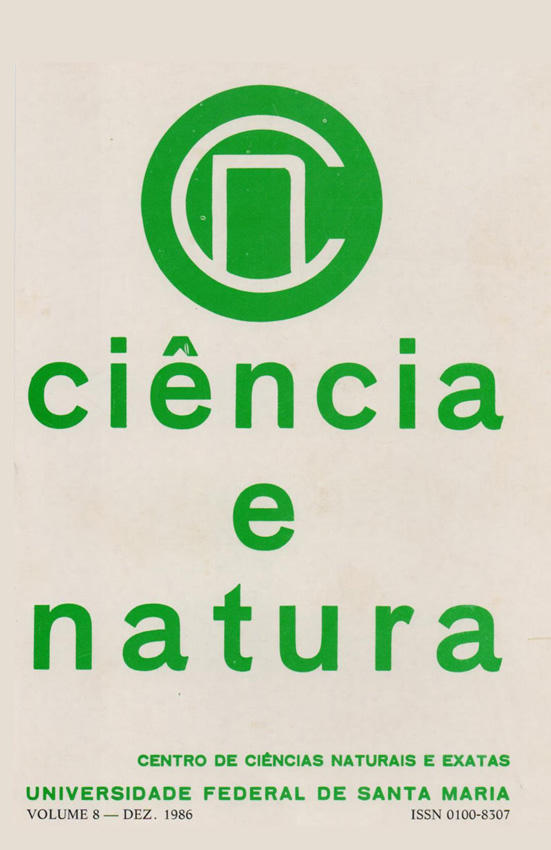Modelização do clima urbano de Santa Maria, RS
DOI:
https://doi.org/10.5902/2179460X25431Resumo
A urbanização impõe modificações no clima local comprometendo a própria atmosfera da cidade e originando o clima urbano. Buscando verificar a existência de clima urbano em Santa Maria, foram realizadas análises climáicas de temperatura, vento e umidade relativa através de dados coletados em trabalho de campo e em estação meteorológicas, associadas as da circulação atmosférica regional. Os resultados obtidos e os exemplos contidos na çiteratura nacional e internacional, somados à análise das componentes geológicas e geourbanas locais, possibilitaram uma proposta de modelização de clima urbano para Santa Maria, localizada na região central do Estado do Rio Grande do Sul, Brasil.Downloads
Referências
BARROS SARTORI, Maria da Graça. O Clima de Santa Maria: do regional ao urbano. Dissertação de Mestrado, Dep. de Geografia da Fac. de Filosofia, Letras e Ciências Humanas da Universidade de São Paulo. São Paulo, 1979. 169 p.
BARROS SARTORI, Maria da Graça. A Circulação Atmosférica Regional e as famílias de tipos de tempo na região central do Rio Grande do Sul. Ciência e Natura , Santa Maria, 3:101-110, 1981.
BARROS SARTORI, Maria da Graça. Considerações sobre a ventilação nas cidades e sua importância no planejamento urbano. Ciência e Natura, Santa Maria, 6:59-74, 1984.
DETWYLER, T. & MARCUS, M.G. Urbanization and Enrironment: the physical: Geogpaphy of city. Belmont, California, Duxbury, 1972.
LOMBARDO, M.A. Ilha de Calor nas Metrópoles: O Exemplo de São Paulo, São Paulo, Ed. Hucitec, 1985.
MONTEIRO, C.A. de F. Teoria e Clima Urbano. São Paulo, Instituto de Geografia da USP, 1976. Série Teses e Monografias 25.
Downloads
Publicado
Como Citar
Edição
Seção
Licença
Para acessar a DECLARAÇÃO DE ORIGINALIDADE E EXCLUSIVIDADE E CESSÃO DE DIREITOS AUTORAIS clique aqui.
Diretrizes Éticas para Publicação de Revistas
A revista Ciência e Natura está empenhada em garantir a ética na publicação e na qualidade dos artigos.
A conformidade com padrões de comportamento ético é, portanto, esperada de todas as partes envolvidas: Autores, Editores e Revisores.
Em particular,
Autores: Os Autores devem apresentar uma discussão objetiva sobre a importância do trabalho de pesquisa, bem como detalhes e referências suficientes para permitir que outros reproduzam as experiências. Declarações fraudulentas ou intencionalmente incorretas constituem comportamento antiético e são inaceitáveis. Artigos de Revisão também devem ser objetivos, abrangentes e relatos precisos do estado da arte. Os Autores devem assegurar que seu trabalho é uma obra totalmente original, e se o trabalho e / ou palavras de outros têm sido utilizadas, isso tem sido devidamente reconhecido. O plágio em todas as suas formas constitui um comportamento publicitário não ético e é inaceitável. Submeter o mesmo manuscrito a mais de um jornal simultaneamente constitui um comportamento publicitário não ético e é inaceitável. Os Autores não devem submeter artigos que descrevam essencialmente a mesma pesquisa a mais de uma revista. O Autor correspondente deve garantir que haja um consenso total de todos os Co-autores na aprovação da versão final do artigo e sua submissão para publicação.
Editores: Os Editores devem avaliar manuscritos exclusivamente com base no seu mérito acadêmico. Um Editor não deve usar informações não publicadas na própria pesquisa do Editor sem o consentimento expresso por escrito do Autor. Os Editores devem tomar medidas de resposta razoável quando tiverem sido apresentadas queixas éticas relativas a um manuscrito submetido ou publicado.
Revisores: Todos os manuscritos recebidos para revisão devem ser tratados como documentos confidenciais. As informações ou ideias privilegiadas obtidas através da análise por pares devem ser mantidas confidenciais e não utilizadas para vantagens pessoais. As revisões devem ser conduzidas objetivamente e as observações devem ser formuladas claramente com argumentos de apoio, de modo que os Autores possam usá-los para melhorar o artigo. Qualquer Revisor selecionado que se sinta desqualificado para rever a pesquisa relatada em um manuscrito ou sabe que sua rápida revisão será impossível deve notificar o Editor e desculpar-se do processo de revisão. Os Revisores não devem considerar manuscritos nos quais tenham conflitos de interesse resultantes de relacionamentos ou conexões competitivas, colaborativas ou outras conexões com qualquer dos autores, empresas ou instituições conectadas aos documentos.






